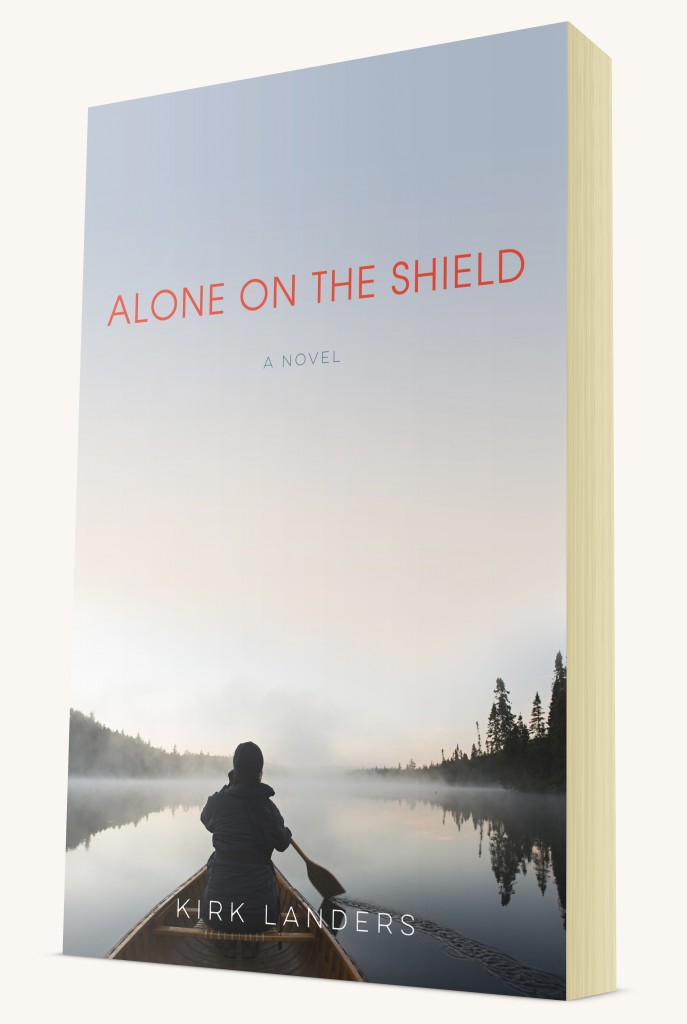 The beginnings of Alone on the Shield originated when President George W. Bush landed on an aircraft carrier in full battle regalia and stood beneath the Mission Accomplished banner for a prolonged photo op orchestrated by a military band.
The beginnings of Alone on the Shield originated when President George W. Bush landed on an aircraft carrier in full battle regalia and stood beneath the Mission Accomplished banner for a prolonged photo op orchestrated by a military band.
As a Vietnam veteran, the event made me crazy. A man who had shirked his military duty during Vietnam and gotten away with it because of his family’s connections was now being feted as a war hero for promulgating a wholly unnecessary war fought with other people’s children.
The idea for Alone on the Shield came into its own during the financial collapse and the onset of the Great Recession, circa 2008. Despite good fortune in my personal life, I was still almost crazy with depression over what was happening in America, especially the fact we were rotating soldiers, sailors and marines to our still raging wars with little or no respite between tours—ruining marriages, shattering psyches and spreading misery like cancer among the noblest Americans of them all.
I assumed my inner rage and depression were based on personal politics and tried to set them aside and get on with my life. Then one day I was chatting with a friend, another Vietnam vet, whose political views are on the opposite side of the aisle. He confided to me that he was having the same feelings, the same sleepless nights, the same outrage over our senseless wars and our abuse of our military personnel.
That’s exactly when the character of Gabe Pender was born. The rage that drives him in the early chapters of the book was exactly the kind of rage my friend and I, and probably many other veterans, were feeling as the grim clouds of the recession descended on America.
There are good things and bad things about writing a book under the influence of that kind of passion. One of the good things is, the main characters are passionate, deep people, so this is a pretty good read for people who like character-driven fiction. One of the bad things: the first draft was so overwrought and overwritten that it took years of rewrites and edits to get it to the book we published in November 2017.
The other passion that drove the writing of Alone on the Shield was a love of Quetico Provincial Park, the crown jewel of the Canadian Shield geological formation. The Canadian Shield was formed by the two great Ice Ages, when glaciers pushed soil from Ontario and Quebec south, leaving ancient rocks and bottomless lakes in their wake. Quetico sits on the Minnesota border facing Minnesota’s Boundary Waters Canoe Area, which is its twin except for a little more soil and a lot more users.
My wife and I first paddled in Quetico in the early 1990s and have paddled there almost every year since. It is one of the most profound experiences I’ve ever had, especially when you get a day or two in from the lakes on the perimeter. It’s not just the beauty of the place, it’s a long checklist of aesthetics, starting with the feeling of space that I’ve never had anywhere else, but also including solitude and a kind of silence that’s not possible in civilization.
Paddling and portaging from lake to lake and camping in a different place every night breaks every pattern of modern living in most of our lives. Dealing with rain, wind, heat and cold without electricity and machines becomes liberating in a way you never expected. Perfect weather days touch your soul in a way they wouldn’t if you were home working in an office and driving a car here and there.
I always wanted to write a novel set in Quetico, partly because it lets me revisit the place in all the many hours it takes to write one, and partly in hopes of spreading the word about this magnificent natural wonder. Usage of Quetico and the Boundary Waters has been declining over the past decade, mainly because fewer young and middle-aged people from the north central states of America are drawn to wilderness canoeing. I can’t help thinking this is a terrible loss for them. Every person I’ve ever talked to who has paddled in Quetico—even once—has great memories of the experience that they will carry with them for their entire lives. That’s certainly true of Taffy and me.
Last spring, I sat on a panel of authors and someone asked us what it took to write a book. There were several great answers from the panel, exploring everything from craft development to networking with other writers, but for me, the answer was having a story to tell. For me, that started with the darkness of the Great Recession and the pristine beauty of Quetico Provincial Park, and the passions of two college lovers who broke up over the Vietnam war.
 “A brilliant, hard look into the mirror of our pasts in which our new, ideal selves break free from their old molds and casts. Landers’s powerful journey into the Canadian wilderness takes readers through trials of self-reflection, endurance, and discovery to find what matters most in life—loves, hatreds, and ideal selves. A true joy to read.” —Ross Ritchell, author of The Knife
“A brilliant, hard look into the mirror of our pasts in which our new, ideal selves break free from their old molds and casts. Landers’s powerful journey into the Canadian wilderness takes readers through trials of self-reflection, endurance, and discovery to find what matters most in life—loves, hatreds, and ideal selves. A true joy to read.” —Ross Ritchell, author of The Knife
“Kirk Landers has written a kind of Deliverance set in the wilderness of Canada, though instead of hillbilly horror, the memorable heroes of this novel—a man and woman rediscovering love in late middle age—confront demons of their own making. Rich in suspense, place, and character.” —Lin Enger, author of The High Divide and Undiscovered Country
“Alone on the Shield is tense and dramatic, absorbing from beginning to end, one of those precious tales that manages to be both a page-turner and a thoughtful novel of great depth and resonance.” —Booklist, starred review
“A compelling mixture of adventure and romance, Alone on the Shield is a tightly focused novel that deftly speaks to growing older and the struggle for understanding.” —ForeWord Magazine
Alone on the Shield is available wherever books and e-books are sold.
No Comments
No comments yet.